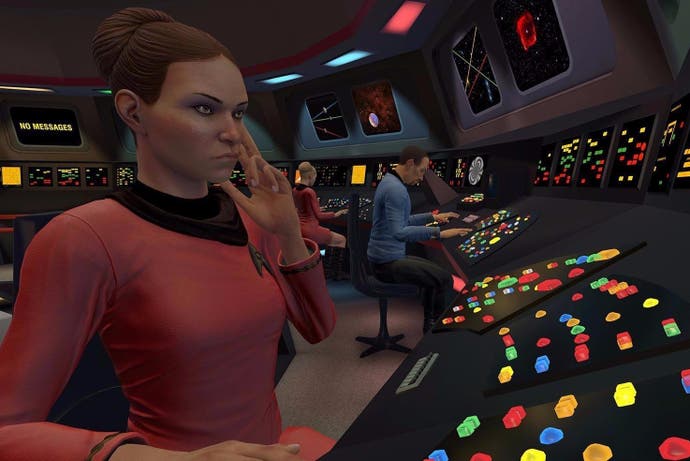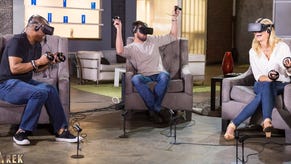Star Trek: Bridge Crew and Ubisoft's ongoing mission to make a game about talking
Spock and spell.
Halfway through my first delightful hour with Star Trek: Bridge Crew, I started to realise I had played it before.
This was unlikely, of course. Bridge Crew is not a sequel. Instead, it's the kind of game idea that, written down, reminds you why Ubisoft remains the most whimsical and idiosyncratic of publishers. A game in which four friends get together - in virtual reality, right? - to engage in the enlightened forum that is the command center of a Federation starship. I was pretty sure, as I sat in the big chair, directing my tactical officer to engage with something or other, that I had probably not played anything like this before. And yet a persistent nagging at the back of my mind was telling me that I had.
Spaceteam? Spaceteam is close: a game about buttons and iPads and shouting at friends. Artemis Spaceship Bridge Simulator? Also close, although I'll admit I haven't experienced that one first-hand. Okay, so Bridge Crew has a clear lineage in other games that are about running spaceships, but there's something else here, a connection I hadn't made before but which now seemed obvious. I sensed that Ubisoft had done this before. Ubisoft had made another game that was just as weird and unlikely as this. Was it a quiet trend? For years, Ubisoft had quietly been trying to make a decent game about talking.
Hours later, I sat up in bed in the middle of the night and shouted, "Tom Clancy's EndWar!" EndWar! Of course. That's the in-house weird uncle to Bridge Crew. Hard as it is to imagine, Star Trek's deep-future space liberalism once brushed shoulders with Tom Clancy's day-after-tomorrow neo-fascism.
EndWar wasn't a hit, so it might be worth offering a bit of a refresher in its strange pleasures. EndWar was part of that endlessly doomed push to get an RTS working on consoles - gaming's own hunt for the Northwest Passage. The idea this time, however, didn't revolve around co-opting beloved IPs or relying on torturous triple-tap control systems. EndWar's central tool was a headset. You spoke to the game. You told the game what you wanted to do, and the game then tried to do this.
I remember playing EndWar a little bit longer than I normally would have just because what it was revealing about games seemed so interesting. EndWar took the complexity of the RTS and said, okay, this genre is actually about three things: who, where, and what. Who are you ordering about, where are you ordering them to go, and what do you want them to do when they get there? The command system of the game was entirely built around these three elements - and these three elements, in turn, absolutely controlled the scope of the game.
No expansive maps here, because how do you meaningfully direct a bunch of tanks to go to that empty bit of space over by the hill that looks quite pretty? Instead, for a place to have meaning in EndWar, it had to have a name. More often than not it was a control point, and so EndWar, as I remember it at least, was the control-pointiest RTS of all time. Capture and hold a bunch of these nameable spaces on the map. Kill everything else that tries to stop you from holding these nameable spaces. There may have been more to EndWar than this, but this, over the years, has been the defining element my memory has boiled the game down to.
It was clever, but sort of stupidly clever, if that's possible: a brilliant solution for a problem that probably didn't need tackling. The similarities with Bridge Crew are fascinating, I think. But so are the differences. Both games are destined to be curios, most likely, but Bridge Crew is by far the more lovable curio.
Bridge Crew's stroke of genius is to recognise that, if you're making a game about talking, there should probably be someone worth talking to. While there was a multiplayer mode in EndWar (annoyingly I never played it) and while there's a single-player mode in Bridge Crew (it is fine in a nothing-left-in-the-house-other-than-Ryvita-ish way), the whole thing really comes together when you're sat in the captain's chair giving orders to real people: a real tactical offer, a real helmsperson, a real engineering buddy.
Often you're not just giving orders. Like EndWar, the focus on instructions that must be verbalised has streamlined the number of things you can do here, so most interactions revolve around moving around the solar system, scanning things, beaming aboard the survivors of something or other, hacking enemy vessels or shooting them to pieces. In singleplayer this sometimes becomes a bit of a drag, but in multiplayer it thrills a little longer, not just because there is the procedural comedy of watching simple tasks go awry when broken down into constituent tasks - there's a bit of QWOP to Bridge Crew at times, a bit of Surgeon Simulator - but because the captain doesn't always have to be the captain. Sometimes you can discuss what you should do with your colleagues. You can have arguments about things. Mini-mutinies.
In other words, while EndWar was a game about telling people what to do, Bridge Crew is frequently a game about discussions. This feels like progress - it's also mad and surprising and hilarious, which helps.
And there's one other thing worth noting, too. Bridge Crew shouldn't work as well as it does. It's a VR game that only truly comes alive in multiplayer - that's a big ask at the moment, I think, and that's a very small audience to target. And yet it does work. You go online - PC and PS4 audiences are wisely intermingled to create the biggest possible playerbase - and there are people to play with waiting there for you. And more: these people are almost always worth playing with. They are entertaining, or they are just flat-out good at this stuff. If they're being funny, that's great because Bridge Crew's a funny game with all those cartoon limbs waving around the place. But often they're not being funny - often they're sort of role-playing. And this turns out to be wonderful too.
Bridge Crew, in other words, proves VR can work if it's selling the right fantasy. And Star Trek illustrates this point so well because it's always done a brisk business in fantasies, selling not just one core dream to its audience, but a dense interlocking network of dreams.
There's the dream of exploring space, of course. That five year mission with nothing to do but pick a point on the empty chart and see what's out there. Who doesn't like that kind of freedom? Lots of people don't like it, I imagine, but for those people Star Trek is selling something else, too: the idea of safety, of belonging, of being part of a gang of buddies. It is selling the dream of competence: of doing an important job and doing it well. It is selling the dream of having great powers, a whole starship at your disposal for whatever scrapes you want to get into. And out there, of course, some of those scrapes will involve meeting the odd alien who might as well, by comparison, be a kind of god, so it's selling a deeper dream still. It is offering perspective, and a humbling vision of our place in the universe.
So many dreams to pick from. So many ways to approach a rich piece of science fiction. This probably explains why I am fairly confident in saying that I am not the only person who used to do this. This being getting together with a bunch of school friends when I was 10 or 11, finding someone who had a BBC Micro with one of those space trading games whose front-end used to mimic the front end of a starship, pulling up a bunch of chairs and arranging things to look like consoles, and then pretending that we were part of Starfleet. The fantasy of the space trader game would be swallowed up by a greater fantasy: we were all on the Enterprise.
Man, I haven't thought about that stuff in years. And I just knew I had played Bridge Crew before somewhere...






